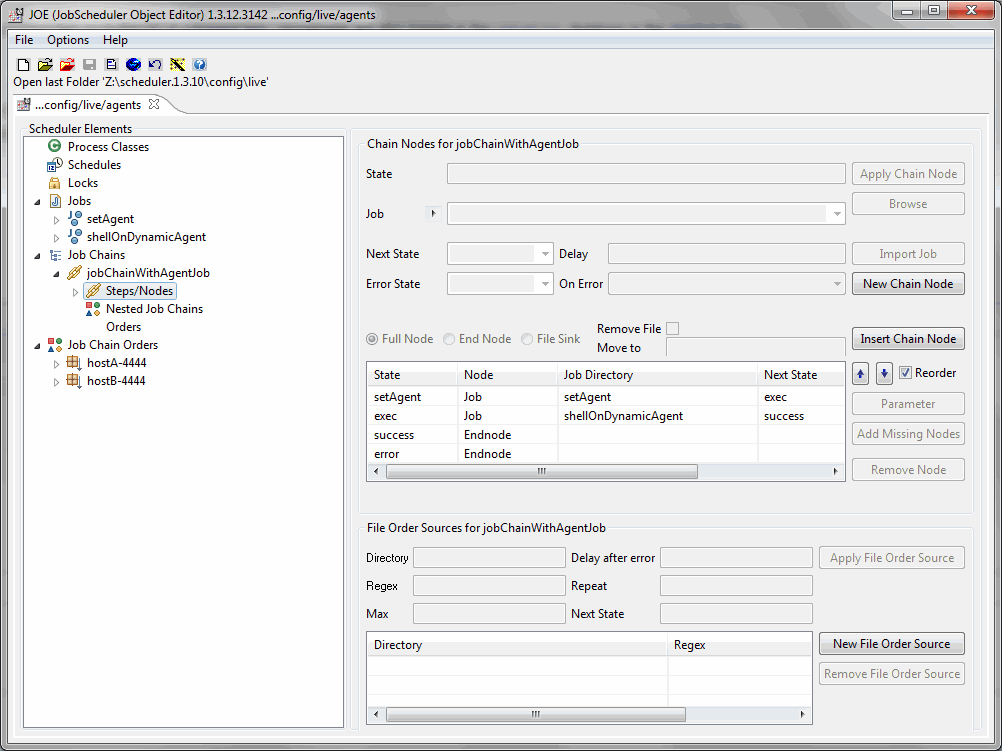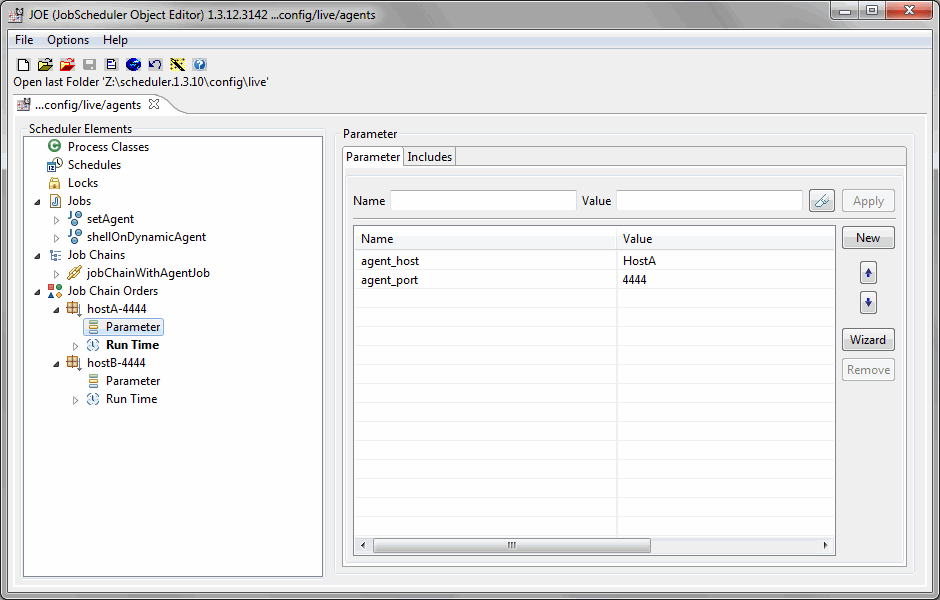| Table of Contents | ||||||||||
|---|---|---|---|---|---|---|---|---|---|---|
|
Scope
- This article explains configuration for the Classic JobScheduler Agent
FEATURE AVAILABILITY ENDING WITH RELEASE 1.10 - For general configuration of the JobScheduler Universal Agent see JobScheduler Universal Agent - Installation & Operation
FEATURE AVAILABILITY STARTING FROM RELEASE 1.10 - For dynamic assignment of JobScheduler Universal Agents to Jobs see:
Jira server SOS JIRA columns key,summary,type,created,updated,due,assignee,reporter,priority,status,resolution serverId 6dc67751-9d67-34cd-985b-194a8cdc9602 key JS-1189
- Consider the How to split and sync a dynamic number of job instances for execution with Agents article.
Process Classes for use with JobScheduler Agents
- We assume that we have a job in a job chain
...
- to be executed on a JobScheduler Agent.
- This requires a process_class that is assigned to the job.
- Please read
...
- How to configure a JobScheduler Master and Agent to work together to know how you create the process class for a JobScheduler Agent and how you assign it to a job.
Process Class configuration
Now we assume that we have use multiple JobScheduler Agents and we want that a job executes the job to be executed on different JobScheduler Agents depending on parameters.
...
...
Create
...
a
...
process
...
class
...
(e.g.
...
with
...
the
...
name
...
_agents_)
...
in
...
JOE
...
with
...
empty
...
values
...
for
...
host
...
and
...
port
...
.
...
The
...
values
...
for
...
host
...
and
...
port
...
are
...
set
...
dynamically.
...
This should result in the following configuration file ./config/live/agents.process_class.xml
...
:
...
Code Block language html/xml
...
<?xml version="1.0" encoding="ISO-8859-1"?>
...
<process_class max_processes="30"/>
Assign the process class to the
orderjob in JOE. In this example the job
is named shell_on_dynamic_agenthas the name shellOnDynamicAgent and calls hostname as a shell command.
noformatSo
you
getshould see the
following
content in the configuration
file
_./config/live/
shell_on_dynamic_agentshellOnDynamicAgent.job.xml
_:
Code Block language html/xml <?xml version="1.0" encoding="ISO-8859-1"?> <job process_class="agents" order="yes" stop_on_error="no"> <script language="shell"> <![CDATA[ #! /bin/sh # returns the hostname of the agent hostname ]]> </script> <run_time/> </job>
Job configuration
- Extends
Create the following job
with a preprocessing.No Format The [JobScheduler API|http://www.sos-berlin.com/doc/en/scheduler.doc/api/api.xml] is used to set the _remote_scheduler_ attribute of the process class to provide that the job is executed on a JobScheduler Agent. The preprocessing script requires the two order parameters _agent_host_ and _agent_port_. Here the preprocessing is implemented in javascript and has the following code:, e.g. setAgent, and add it to the job chain as the forerunner of the JobScheduler Agent job.
This job modifies the process_class setting of the successor job in the job chain according to the order parameters agent_host_ and _agent_port:
Code Block language html/xml <?xml version="1.0" encoding="ISO-8859-1"?> <job order="yes" stop_on_error="no"> <params /> <script language="java:javascript"><![CDATA[ function spooler_process() { var curOrderCode Block language javascript function spooler_task_before()\{ var agentHost = spooler_task.order; var agentHost = curOrder.params.value('agent_host'); var agentPort = spooler_task.ordercurOrder.params.value('agent_port'); var nextJob = curOrder.job_chain_node.next_node.job; spooler_log.info("The agentParams agentHost:agentPort = " + agentHost + ":" + agentPort + " will be used."); spooler_jobagentPort); spooler_log.info("before: "+nextJob.process_class.remote_scheduler); nextJob.process_class.remote_scheduler = agentHost+":"+agentPort; \}
No Format spooler_log.info("after: "+nextJob.process_class.remote_scheduler); return true; } ]]></script> <run_time /> </job>
Job chain configuration
Add these jobs to a job chain, e.g. jobChainWithAgentJob:
This will result in the job chain configuration file ./config/live/
shell_on_dynamic_agentjobChainWithAgentJob.job_chain.xml
_:
Code Block language html/xml <?xml version="1.0" encoding="ISO-8859-1"?> <job_chain <job processorders_classrecoverable="agentsyes" ordervisible="yes"> <script language="shell"<job_chain_node state="setAgent" job="setAgent" next_state="callAgent" error_state="error"/> <job_chain_node state="callAgent" job="shellOnDynamicAgent" next_state="success" error_state="error"/> <job_chain_node state="success"/> <job_chain_node state="error"/> </job_chain>
Order configuration
Add an order to the job chain jobChainWithAgentJob for each JobScheduler Agent.
For example, one JobScheduler Agent runs on HostA with port 4444 and another JobScheduler Agent runs on HostB with port 4444. The order has to be assigned the parameters agent_host_ and _agent_port.
This should result in the order configuration files ./config/live/jobChainWithAgentJob,hostA-4444.order.xml and ./config/live/jobChainWithAgentJob,hostB-4444.order.xml:
Put the job into a job chain (e.g. job_chain_with_agent_job).Code Block language html/xml <?xml version="1.0" encoding="ISO-8859-1"?> <order> <params > <![CDATA[ #! /bin/sh # returns the hostname of the agent hostname <!-- for ]]> use with JobScheduler releases </script> before 1.10 <monitor <param name="setagent_agenthost" orderingvalue="0HostA"/> <script language="javascript"--> <![CDATA[ function spooler_task_before()\{ var agentHost = spooler_task.order.params.value('agent_host'); var agentPort = spooler_task.order.params.value('agent_port'); spooler_log.info("The agent " + agentHost + ":" + agentPort + " will be used."); spooler_job.process_class.remote_scheduler = agentHost+":"+agentPort; \}-- for use with JobScheduler releases starting with 1.10 --> <param name="agent_host" value="http://HostA"/> <param ]]> </script>name="agent_port" value="4444"/> </monitor>params> <run_time/> </job>
No Format So you have the configuration file _./config/live/job_chain_with_agent_job.job_chain.xml_:</order>
Add an order to the job chain job_chain_with_agent_job for each JobScheduler Agent you want.Code Block language html/xml <?xml version="1.0" encoding="ISO-8859-1"?> <order> <params > <job_chain orders_recoverable="yes" visible="yes"> <!-- for use with JobScheduler releases before 1.10 <job_chain_node <param state="100" jobname="shell_on_dynamic_agent" next_state=host"success" error_statevalue="errorHostB"/> <job_chain_node state="success"/> --> <job_chain_node state="error"/> </job_chain>
No Format For example one agent is on HostA with port 4444 and another agent is on HostB with port 4444. The orders must have the parameter _agent_host_ and _agent_port_. So you have the configuration files _./config/live/job_chain_with_agent_job.job_chain.xml_:!-- for use with JobScheduler releases starting with 1.10 --> <param name="agent_host" value="http://HostB"/> <param name="agent_port" value="4444"/> </params> <run_time/> </order>

